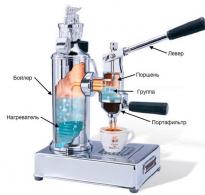Carbohydrate content in coffee. Calorie coffee natural, ground
Julia Vern 31 223 2
Coffee is one of the few drinks of natural origin, consisting of a huge range of various substances, both organic and inorganic, that significantly affect almost all structures and systems of the human body.
Freshly brewed coffee without sugar contains about 1200 natural ingredients, of which more than half are aromatic compounds that determine the taste of the drink.
The taste of the drink is determined by the huge number of volatile compounds that make up its composition.
The chemical composition of coffee
Caffeine belong to the group of alkaloids that stimulate the activity of the central nervous system. For the first time, caffeine was obtained from coffee beans, which is why it got its name. The drink owes its tonic effect, which increases mental and physical performance, to caffeine.
According to modern requirements, when making coffee, caffeine in it must be at least 0.7%, which directly depends on the degree of maturation of coffee beans and their roasting.
At this concentration, one teaspoon of freshly ground natural coffee will contain 0.1-0.2 grams of pure caffeine, which is quite enough to obtain the appropriate tonic effect.
It is not recommended to exceed the dose of caffeine above 0.3 grams at a time for 3-4 hours - regular excess of the dosage stimulates the manifestation of increased excitability, sleep disturbances, increased heart function.
Trigonelline- an alkaloid, in its pure form, tasteless and odorless, but during heat treatment it is converted into pyridine - a substance that gives coffee a specific aroma. Another striking chemical property of trigonelline is its close chemical relationship with nicotinic acid (vitamin B3). The nicotinic acid molecule is part of trigonelline and is easily released when heated, which ensures a constant amount of vitamin B3 in the drink.
Vitamin B3 plays an important role in the metabolism in the body, stimulates the activity of the nervous system. The lack of this vitamin leads to a disease such as pellagra.
A nicotinic acid is not the only B vitamin found in coffee beans. After the appropriate processing of natural coffee, the entire palette of vitamins of this group was found in the drink, as well as:
- the mandatory presence of vitamin A, which is involved in growth and development;
- vitamin D, which improves the absorption of calcium and phosphorus in the intestine;
- vitamin E, which is a participant in the processes of reproduction and a stimulant of the immune system.
Coffee contains a significant amount of complex organic compounds. it proteins and amino acids that perform nutritional and energy functions for the cells of the body. Coffee beans are one of the rare plant foods that contain essential amino acids that the body obtains from meat and fish. Such amino acids are not synthesized in the human body and are involved in the regenerative functions of cellular mechanisms and maintain immunity at a sufficiently high level.

The structure of the caffeine molecule
Overall volume carbohydrates in a raw coffee bean is about 50% of its mass. These energy valuable substances for the body are presented as simple sugars - sucrose and fructose, as well as complex polysaccharides - cellulose, fiber, pectin substances, which are an indispensable basis for the nutrition of brain nerve cells.
Minerals in coffee include potassium, magnesium and calcium. These inorganic elements are part of the bones, ensure the functioning of muscles, regulate the functioning of the heart, blood vessels and brain.
Raw coffee beans contain about 850 different essential compounds, and roasted - about 350, which deservedly awarded the title of the most fragrant coffee.
Nutritional value of coffee
Despite such a diverse composition, coffee made from freshly ground natural beans does not have such a high calorie content, which is due to the easy digestibility of the substances that make up its composition. The process of absorption and digestion is further stimulated by caffeine, which is also known to be found in coffee drinks.
Depending on the type of coffee and the method of its preparation, its nutritional value per 100 grams of product without sugar, on average, is:
- proteins, all kinds - 0.2 g,
- fats - 0.6 g,
- carbohydrates - 0.1 g,
- calcium - up to 5 mg,
- vitamin B3 - 0.6 mg,
- potassium - 9 mg,
- phosphorus - 7 mg,
- iron - 2 mg.

Coffee can have both positive and negative effects on the human body.
The effect of coffee on human health
Given the rich chemical composition, coffee has both favorable and negative effects, which directly depends on the individual characteristics of the person and the amount of drink consumed per day. The general picture of the effect of a coffee product on the body is as follows:
- regular intake of pure caffeine in a volume of more than 1000 mg, which coffee is richest in, can cause an addiction phenomenon, similar to drug or alcohol;
- coffee has a sufficient diuretic effect, therefore, if signs of dehydration appear, it is necessary to increase the amount of fluid you drink;
- in healthy people who do not suffer from high blood pressure, coffee causes a general increase in pressure by 10-15 mm Hg. In people suffering from hypertension and related cardiovascular diseases, the pressure can increase much more or, conversely, decrease, which greatly limits them in coffee drinking;
- There is no direct effect of caffeine on the heart. Coffee acts on cardiac activity indirectly - by increasing blood pressure, by stimulating the central nervous system;
- regular use of unfiltered coffee often leads to an increase in total cholesterol in the blood, which inevitably leads to vascular pathologies, characterizing the appearance of problems with blood pressure;
- improvement of attention, labor productivity, increase in the level of memory and mood - a temporary phenomenon. Depending on the reactivity of the body, a similar effect disappears after 30-120 minutes;
- coffee enhances the effect of some painkillers, for example, acetylsalicylic acid and analgin, reduces the risk of Parkinson's and Alzheimer's diseases due to a temporary vasoconstrictor effect and a direct effect on brain neurons, the so-called "training" effect of these organs occurs;
- regular coffee consumption reduces the risk of constipation and cirrhosis of the liver, breast cancer in women;
- in the elderly, coffee reduces the density of skeletal bones, which can cause cracks and fractures;
- people who drink more than two cups of coffee a day are more likely to develop urolithiasis;
- Pregnant women are advised not to drink more than a cup of coffee a day. Due to the increase in blood pressure, due to the effects of caffeine, it is possible to develop anemia of the placenta, premature birth and low body weight of the newborn, as well as miscarriages and stillbirths.
Advantages and disadvantages of instant coffee
The production of instant coffee involves the brewing of coffee beans, obtaining a coffee drink and its subsequent drying. In this case, there is an intensive release of all soluble elements contained in coffee beans, and their re-insertion into the finished mass of the soluble substance, which cannot but be accompanied by losses. Therefore, the main disadvantage of instant coffee is the loss of some valuable nutrients (vitamins, essential amino acids, proteins) and the weakening of the aroma due to the evaporation of essential oils. Also, instant coffee has a more obvious bitter taste.

Instant coffee contains fewer nutrients than ground coffee
Manufacturers are trying to compensate for the losses by adding these substances to the finished product, which inevitably leads to its rise in price. Therefore, the cheaper the coffee on the counter, the poorer its taste and aroma. In addition, in the manufacture of instant coffee, natural coffee production waste is used, more often from rejected beans.
Perhaps the only advantage of instant coffee is the speed of preparation and the increase in its shelf life.
According to statistics, coffee is a low-calorie product. Only syrup, milk or sugar added to it can add calories to this drink. Caffeine, which is part of coffee, is bitter, therefore, wanting to eliminate bitterness, many coffee lovers add something sweeter to the cup. Naturally, in this case, the number of calories will directly depend on the size of the container and the amount of sweets added. If coffee is made with water, then you don’t have to worry too much about its calorie content.
Coffee contains the following carbohydrates: sucrose, pectin, cellulose. Everyone who decides to go on a diet is interested in the question: "How many carbohydrates are there in coffee?" It mostly depends on what kind of coffee you drink. The fact is that you need to pay attention to the preparation of this product. If you use unroasted coffee beans, they will have the lowest amount of carbohydrates: natural instant coffee has 10.3 g of them. Natural brewed coffee without sugar has 4.1% carbohydrates. Of course, it is best to opt for high-quality brewed coffee. The modern market offers a wide range of instant coffee. But not all buyers pay attention to its composition - and it contains only flavors and sugar, so you should think about whether you should drink such a coffee drink.
The absorption of carbohydrates occurs from the cavity of the gastrointestinal tract into the extracellular fluid. It culminates in the metabolism of carbohydrates in the digestive system. The process of their absorption occurs in the form of monosaccharides: glucose and galactose are absorbed more actively. Carbohydrates are divided into simple and complex. Simple ones are absorbed much better than complex ones. If the food is cold, absorption will be slower. You also need to know that rough and fibrous foods (especially those with a high fiber content) are absorbed worse. Fatty carbohydrates are also absorbed slowly.
Coffee, which contains small amounts of carbohydrates, has its pros and cons. The pluses include a feeling of cheerfulness and activity for the whole day. In addition, coffee without additives has a positive effect on weight loss as part of a comprehensive weight loss program. However, do not forget about the cons: drinking coffee (especially in large quantities) can have a very detrimental effect on the central nervous system. Receiving carbohydrates in large quantities (and they are a source of energy), the human body begins to work in a completely different way: increased excitability appears, which at the end of the day can develop into panic fatigue. This can affect the endocrine system, as well as disrupt the work of the heart.
Julia Vern 28 179 0
It is necessary to take into account the energy value of products for those who monitor their weight, follow a diet for weight loss, or, on the contrary, want to get a little better. Therefore, lovers of an invigorating drink are often interested in the calorie content of instant coffee without sugar. The amount of energy absorbed by the body from a particular food product depends on its composition: the amount of proteins, fats, carbohydrates and alcohols.
Instant coffee powder contains approximately 40 g of carbohydrates, 12 g of protein, 0.5 g of fat per 100 grams of the product. The energy value averages 240 kcal and is determined mainly by monosaccharides and polysaccharides (76%), to a lesser extent by proteins (22%) and to a small extent by fats (2%). Of course, 100 g of instant coffee is not drunk in one day, so it is important to know the calorie content per 100 grams of the finished product - a drink prepared with water.
After dilution of the dry product with water, the energy value of coffee will depend on its concentration. Usually, no more than a spoonful of coffee powder is added to the cup. Therefore, the final will be the calorie content in 1 teaspoon, and it is this moment that excites those who want to drink coffee while following a diet.
The answer to it can be given approximately, since different types of coffee are characterized by differences in density and chemical composition. In one spoon without a slide, about 3–4 g of coffee is placed, with a slide - approximately 6 g.
The US Department of Agriculture provided data on the energy value of products: according to this information, 100 grams of instant coffee prepared with water without sugar contains only 2 kcal. This amount is so small that it practically does not affect the recommended daily calorie intake of foods. But we are talking about ordinary instant coffee without sugar, cream and other additives, which most often determine the energy value of the drink.

Calorie content of different types of coffee
The calorie content of instant coffee without sugar depends on its type, since different varieties and differing technologies for processing coffee beans when creating an instant product affect its composition and digestibility. According to the results of testing instant coffee of several brands, the studied samples contain different amounts of kilocalories:

Energy value of coffee additives
The maximum calories are found in coffee additives: milk, cream. Therefore, less high-calorie skimmed milk and vegetable cream are often used to make drinks. The number of calories differs for different supplement options (data are given in kilocalories per 100 grams of product):
- cream with a fat content of 10% contains 119, 20% - 207, 35% - 337 kcal;
- dry cream 42% - 579 kcal;
- milk 3.5% - 62; 3.2% - 60, 2.5% - 54, 1.5% - 45 kcal;
- skimmed milk or a dairy product with a low fat content of up to 1% provides the body with 32 to 43 kcal;
- 100 grams of McDonalds liquid cream contains 20 kcal;
- vegetable cream 4% includes 89, 29% - 510, 35% - 543 kcal.
Adding cream, milk, syrup, honey to coffee will significantly increase its energy value. Therefore, for those who like to wake up with coffee in the morning and at the same time follow a strict diet, the best option would be to forego high-calorie supplements or stick to low-fat dairy and plant products.

An alternative to cream and milk can be spices and fruits. Many of them perfectly complement and enrich the coffee taste, add special notes to the aroma of the drink, and at the same time they contain a minimum of calories. Few people will be indifferent to coffee recipes with orange slices, cinnamon, vanilla, cloves, cardamom or star anise.
There are variants of the drink with the addition of alcohol, but the main ingredient in such recipes is usually ground natural coffee. In addition, alcohol is a high-calorie product: the energy value of cognac is 239 kcal per 100 grams, for liquor it is even higher - from 299 to 345 kilocalories, because in addition to alcohol it also contains a large amount of carbohydrates.
Strong forty-degree rum, often used in recipes for coffee drinks, contains 231 kilocalories per 100 ml.
Thus, those who like to drink instant coffee without sugar and any additives can not bother counting calories. The energy value of this version of the drink is low. The introduction of certain additives significantly increases the calorie content of coffee and should be taken into account when following a diet.
Natural coffee, ground rich in vitamins and minerals such as: vitamin B2 - 11.1%, vitamin PP - 96.5%, potassium - 64%, calcium - 14.7%, magnesium - 50%, phosphorus - 24.8%, iron - 29.4%
What is useful Coffee natural, ground
- Vitamin B2 participates in redox reactions, increases the susceptibility of color by the visual analyzer and dark adaptation. Inadequate intake of vitamin B2 is accompanied by a violation of the condition of the skin, mucous membranes, impaired light and twilight vision.
- Vitamin PP participates in redox reactions of energy metabolism. Inadequate vitamin intake is accompanied by a violation of the normal state of the skin, gastrointestinal tract and nervous system.
- Potassium is the main intracellular ion involved in the regulation of water, acid and electrolyte balance, is involved in the processes of nerve impulses, pressure regulation.
- Calcium is the main component of our bones, acts as a regulator of the nervous system, is involved in muscle contraction. Calcium deficiency leads to demineralization of the spine, pelvic bones and lower extremities, increases the risk of osteoporosis.
- Magnesium participates in energy metabolism, synthesis of proteins, nucleic acids, has a stabilizing effect on membranes, is necessary to maintain homeostasis of calcium, potassium and sodium. Lack of magnesium leads to hypomagnesemia, increased risk of developing hypertension, heart disease.
- Phosphorus takes part in many physiological processes, including energy metabolism, regulates the acid-base balance, is part of phospholipids, nucleotides and nucleic acids, is necessary for the mineralization of bones and teeth. Deficiency leads to anorexia, anemia, rickets.
- Iron is a part of proteins of various functions, including enzymes. Participates in the transport of electrons, oxygen, ensures the occurrence of redox reactions and activation of peroxidation. Insufficient consumption leads to hypochromic anemia, myoglobin deficiency atony of skeletal muscles, increased fatigue, myocardiopathy, atrophic gastritis.
A complete guide to the most useful products you can see in the application
A shot of unsweetened espresso has virtually no calories. Many people themselves increase the energy value by adding milk, sugar, ice cream, liquor or syrup. Those who adhere to the basics of proper nutrition should know how many calories are in coffee, what is its composition, how fat content changes when milk or cream is added. Whether there are many carbohydrates in coffee products depends on various factors. Least of all in a freshly brewed drink made from ground grains.
To carbohydrates - one of the key sources of energy - most people are prejudiced. Common carbohydrate-free nutrition systems consider carbohydrates to be harmful and are almost completely excluded from the daily menu.
- A cup of pure espresso or americano will not hurt your figure and will not affect the total amount of carbohydrates in the diet.
- It is difficult to answer the question about the level of carbohydrates unambiguously. It is important to consider:
- type of coffee;
- the degree of roasting of the grains;
- serving size;
- type of coffee product;
- cooking method;
- the temperature of the drink being consumed;
- the amount of additives.
- The lowest levels of carbohydrates are found in unroasted coffee beans.
- On the packaging, the manufacturer indicates information about the calorie content, as well as the amount of carbohydrates, proteins and fats. The calculation is given per 100 grams, but it is necessary to distinguish what is at stake:
- 100 g of the product - all indicators are calculated for dry matter, 2 tsp will be needed to prepare a cup of aromatic drink. powder, which means that the calorie content and BJU indicators will proportionally decrease;
- 100 g of drink - this volume of coffee contains the indicated amount of KBJU.
- In instant coffee, about 20% of natural substances, and the rest - preservatives, flavors, stabilizers. In addition to the fact that such a chemical cocktail can cause a number of health problems, the carbohydrate content is much higher than in many other coffee drinks.
- Coffee speeds up the absorption of carbohydrates. This means that the dessert eaten will be digested better, and the total daily calorie content will be increased.
- The rate of absorption of carbohydrates is influenced by the temperature of the drink consumed. They are most quickly absorbed by the human body from what is consumed hot, so it is recommended to drink coffee warm.
- Average values of carbohydrates contained in 1 serving of coffee drinks (per 100 g):
- black ground coffee without sugar and other additives - 0.4 g;
- black coffee with milk - 1 g;
- black coffee with milk and 1 tsp. sugar - 6 g (each additional spoonful of sugar increases the amount of carbohydrates by 5 g);
- latte, a drink without sugar with milk, - 5.7 g;
- latte with syrup - 12 g;
- cappuccino without sugar - 3.7 g;
- cappuccino from McDonald's or Starbucks, which whipped foam is made from fatter milk or cream - 5 g;
- instant coffee - 7 g;
- soluble with milk - 9.3 g;
- coffee with condensed milk - 10.9 g.
What BJUs are contained in coffee
Chemical complex. Like any other food or drink, it contains proteins, fats and carbohydrates. Their level varies depending on the recipe. Nevertheless, it is important to consider the chemical composition in order to create a balanced daily diet for health and immunity.

The composition of raw coffee beans is approximately 10% protein, 10-12% fat and 30-40% carbohydrates. After roasting and further cooking, the structure changes somewhat. Types of compounds that fill the body with a source of elements necessary for life:
- Carbohydrates. Various types predominate in black coffee: sucrose, cellulose, pectin, etc. Studies have found that there is more sucrose in Arabica, and reducing sugars in Robusta beans. In espresso, the content of carbohydrates that provide energy is small. By adding ingredients that increase their content, an excess enters the body, which leads to the opposite effect - fatigue or even a breakdown appears.
- protein substances. Three varieties of coffee (Arabica, Robusta and Liberica) contain approximately the same amount of protein - the most important component for building new cells and tissue. This content is small. Most of it is amino nitrogen, that is, the nitrogen found in amino acids.
- Fats. Coffee is a vegetable raw material rich in lipids. Their general properties are determined by the fatty acids that make up the composition. For those who follow the calorie content of the diet, the concept of "fats" is associated with something harmful. But this is the most important source of energy, which, splitting, frees it. Its participation in the construction and renewal of tissue cells is also important. A cup of coffee drink contains the most of the following essential fatty acids:
- linoleic - prevents an increase in cholesterol levels, prevents the appearance of blood clots, regulates fat and protein metabolism, fighting excess weight;
- palmitic - helps to renew and regenerate skin tissues;
- oleic - slows down the development of heart disease, participates in the construction of cell membranes, helps beneficial substances to penetrate into cells, normalizes skin condition.

Milk is a frequent companion of coffee, changing its chemical composition:
- frappuccino - a mixture of coffee, milk, syrup and crushed ice, whipped until foamy and decorated with cream, contains 9.5 g of protein, 9.6 g of fat and 43 g of carbohydrates;
- moccachino, combining high-calorie ingredients such as milk, cream and chocolate, BJU, respectively 3 g - 10.5 g - 46.5 g;
- the glass, in which a scoop of ice cream is added, contains 4 g of proteins and fats and 20 g of carbohydrates;
- cappuccino, prepared on the basis of espresso with the addition of heated frothed milk, contains the following ratio of BJU: 2.2 g - 2.6 g - 3.7 g.
Knowing the calorie content and daily intake of BJU of various coffee drinks, you can choose the right one and enjoy the taste without harm to health.






